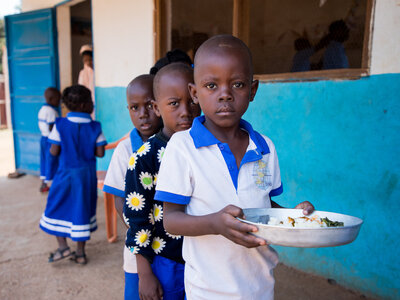Central African Republic
- 31%
- of people are severely food insecure
- 68%-PLUS
- of people living below the poverty line
- 4.8 million
- population
Despite its agricultural potential and mineral wealth, the Central African Republic faces significant security issues and local inflation, worsened by global crises, all of which have led to a decline in living standards. A total 31 percent of the population has severe food insecurity.
The country has seen an influx of refugees due to the Sudan crisis, including returnees from CAR, in the northeastern region. In some locations, the refugee population is outnumbering local residents. Additionally, there are Chadian refugees and CAR returnees in the northwest.
These displacements significantly exacerbate food needs in areas already facing resource limitations, especially as they become isolated during the rainy season from June to December each year.
The World Food Programme (WFP) works to improve food security and nutrition for the most vulnerable people. WFP also addresses the root causes of hunger while strengthening local capacities and systems to enhance resilience against future shocks.
WFP plans to further integrate crisis response with early-recovery activities, assisting vulnerable populations in transitioning from crisis situations to conditional support, while bolstering food systems using home-grown school meal programmes as a foundation.
What the World Food Programme is doing in Central African Republic
-
Emergency response
-
WFP plays a crucial role in emergency response efforts, addressing the urgent food and nutrition needs of vulnerable communities. By distributing food, including specialized nutritious products, and providing cash-based assistance, WFP ensures that those affected by conflict, instability and climate shocks can access essential resources. As conditions improve and stability returns to certain areas, WFP supports refugees and internally displaced people in their journey back home, focusing on rebuilding livelihoods. Additionally, WFP’s school-meal programmes enhance children's nutrition and encourage higher school attendance, fostering resilience in regions severely impacted by food insecurity.
-
Nutrition support
-
Early recovery and resilience
-
Capacity strengthening
-
Support to smallholder farmers
-
UNHAS
Publications
Central African Republic news releases
Go to pageFind out more about the state of food security in Central African Republic
Visit the food security analysis pageOperations in Central African Republic
Contacts
Office
Bangui Rue de l'amp #39 Universite, Bangui, Republique CentrAfricaine, BP 1048 Bangui, Republique CentrAfricaine
Bangui
Central African Republic


